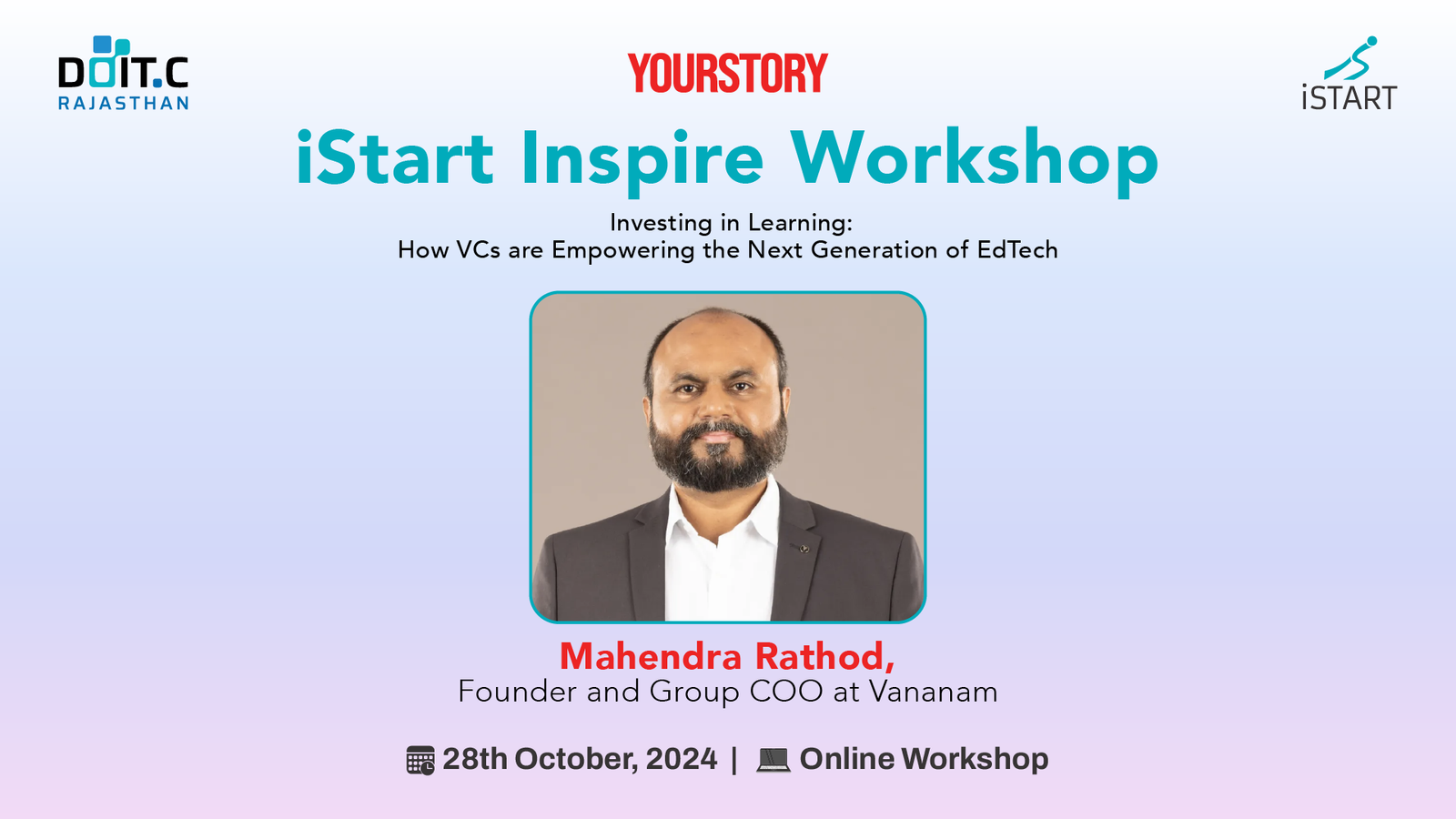[ad_1]
The Indian edtech landscape has evolved dramatically, moving beyond traditional classrooms to embrace AI-powered learning platforms and personalised digital experiences. With the sector projected to reach $29 billion and growing at a healthy CAGR of 24%, understanding the dynamics of this transformative industry becomes crucial for entrepreneurs. At a virtual workshop hosted by iStart Rajasthan in partnership with YourStory, Mahendra Rathod, Founder and Group COO, Vananam, shared detailed insights on building successful edtech ventures.
The workshop was part of iStart Inspire, an initiative by iStart Rajasthan, the state’s comprehensive startup platform. Through its holistic approach to startup development, iStart has been instrumental in fostering innovation and facilitating regional investment, providing crucial resources including mentorship, funding opportunities, and access to investor networks.
The current state of Indian edtech
The edtech ecosystem in India has witnessed remarkable growth, with over 5,000 startups launched and 400+ successfully raising funding. Rathod emphasised that while these numbers are impressive, they also indicate the level of competition and the need for clear differentiation. The industry has seen significant consolidation, with 120+ mergers and acquisitions, indicating a maturing market that rewards sustainable business models.
In his analysis of the sector, Rathod identified four major categories driving growth. The skill development segment, valued at $2.5 billion, shows particular promise given the constant need for upskilling in the AI era. The K-12 education segment presents a $15 billion opportunity, while test preparation and online certification continue to grow steadily. He noted that skill development’s significance stems from its direct correlation with evolving workforce demands and the continuous need for professional development in an AI-driven economy.
Emerging trends reshaping education
The future of edtech, according to Rathod, lies in making education more accessible and engaging. He emphasised the growing importance of vernacular education and affordable learning solutions for Tier II and III cities, noting that accessibility must be coupled with quality and effectiveness. The integration of AI-driven personalisation has enabled adaptive learning paths, creating more effective educational experiences for students.
Technological innovation continues to shape the sector’s evolution. Gamification has emerged as a powerful tool for engaging learners, while VR/AR technologies are creating immersive learning experiences that were previously impossible. Community-driven learning platforms have gained traction, facilitating peer-to-peer education and creating more interactive learning environments. The role of government initiatives, including the National Education Policy and various digital learning schemes, has been crucial in providing the regulatory framework and support needed for the sector’s growth.
Building sustainable edtech businesses
Drawing from his experience mentoring over 50 startups, Rathod provided comprehensive guidance on building sustainable edtech ventures. He emphasised that the first rule is to build a business, not just a product, cautioning against over-attachment to specific products or features. This approach allows for greater flexibility and adaptation to market needs.
On the funding aspect, Rathod shared critical insights about approaching investors. VCs typically evaluate startups based on four key elements: a clearly defined problem, market size, solution approach, and team capability. He advised startups to demonstrate revenue and proven unit economics before seeking venture capital, noting that ideas alone rarely attract serious investment.
The human aspect of building startups received particular attention during the workshop. Rathod compared finding a co-founder to marriage, emphasising the importance of complementary skills and aligned purposes in founding teams. He stressed that co-founders need to share not just skills but also values and vision for the company’s future.
First-level leaders play a crucial role in executing the founders’ vision, while the first 10 employees often shape the company’s culture and capabilities. Rathod emphasised that these early team members need to be not just skilled but also aligned with the company’s mission and values.
Continuous learning and adaptation
Concluding the workshop, Rathod stressed the importance of being “dispassionately passionate” – maintaining enthusiasm while being willing to adapt based on market feedback. He advocated for continuous learning through reading, attending industry events, and networking with peers. This commitment to personal development, he argued, is essential for staying ahead in the rapidly evolving edtech landscape.
The workshop, which attracted numerous aspiring and early-stage entrepreneurs, exemplified iStart Inspire’s commitment to providing practical, experience-based knowledge to the startup ecosystem. As the edtech sector continues to evolve, such comprehensive insights from industry veterans become increasingly valuable for entrepreneurs looking to create sustainable, impact-driven businesses in the education technology space.
[ad_2]
Source link





